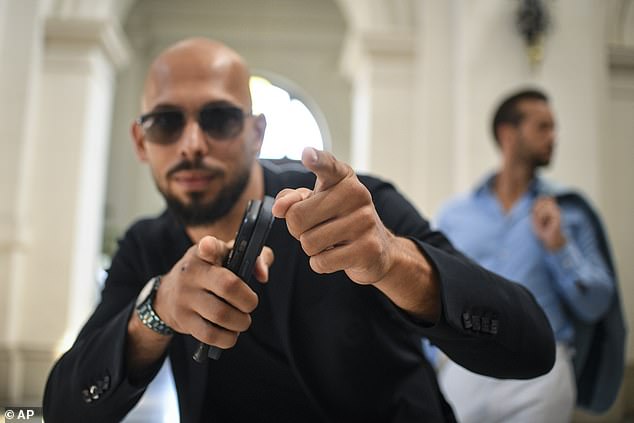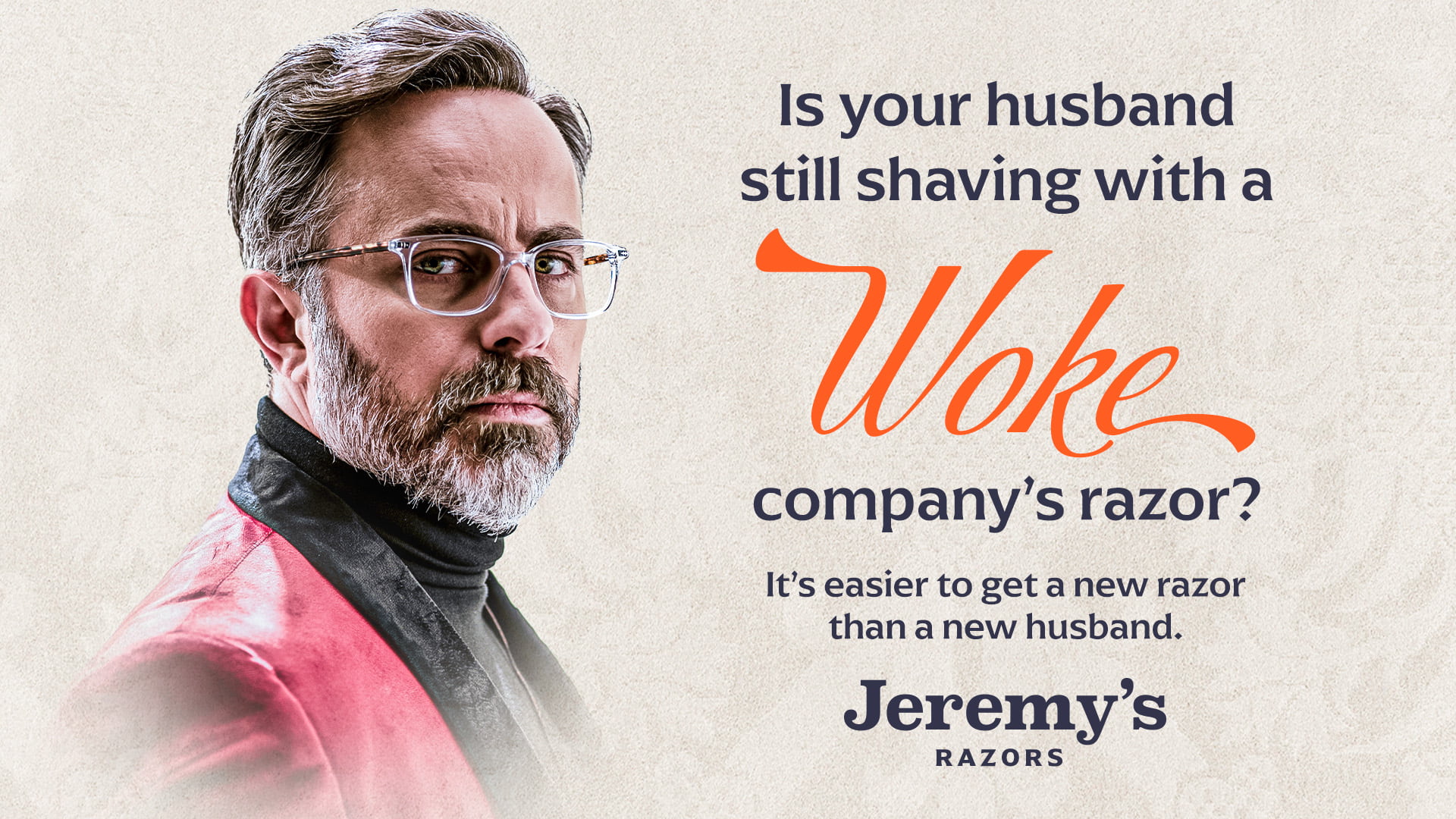With a high-powered job working in sales in London, 23-year-old Jasdeep Singh seems to have it all.
But there is one thing he believes is standing in the way of his career progression: women.
He is convinced the females he works with have it easier, get more done for them and are tiptoed around by male co-workers frightened of being accused of sexism – or worse.
‘Things have gone too far in favour of women,’ he tells the Mail. ‘It’s become quite extreme in certain ways.
‘Don’t get me wrong, it’s good to highlight some of the issues they face. But I do feel discriminated against. It’s definitely easier for women in the workplace.
‘It’s basic stuff, such as if there’s a choice for someone to be on their feet all day or someone to sit down, the guy will be asked to do the former while the woman gets to do the latter.’

Even social interactions with the opposite sex are fraught for men these days, he says.
‘I do feel I have to think through every possible way a woman can interpret something as simple as ‘Do you want a coffee?’
‘Am I being patronising or sexist? Women don’t have the same cautious behaviour with us.
‘They think very differently. There’s a certain entitlement.’
His views may sound shocking to many women who feel men are still the more entitled sex, yet Jasdeep is not an outlier.
According to a groundbreaking survey commissioned by Secrets & Lives, a significant number of British men display anti-feminist sentiment.
Of 1,000 UK men aged 16 and over polled by Survation, nearly a third (31 per cent) say feminism has negatively affected men.
But this doesn’t mean the majority feel it’s been a good thing for them: 30 per cent say it’s had neither a good nor bad impact, while 5 per cent don’t know. In fact, just 34 per cent say it’s had a positive impact.
Just under half of men (49 per cent) agree that ‘we have gone so far in the promotion of equality for women that we now discriminate against men’. Just 19 per cent disagree.
And more than half of all males (51 per cent) also say ‘men are unfairly blamed for problems in our society’. This rises to 61 per cent among 25 to 34 year olds.
While these are views you might expect from older men, our survey is especially revealing when it comes to 16 to 24-year-old men like Jasdeep – what’s known as ‘Gen Z’, widely considered to be the more ‘woke’ generation.
Their views are markedly more extreme than those aged 25 and older, suggesting that anti-feminist sentiment is on the rise.
Our findings reveal a staggering 51 per cent of 16 to 24-year-old men in the UK think feminism has gone ‘too far’ – compared to 42 per cent of all men.
Some 56 per cent in this age group say men are discriminated against due to promoting equality for women – the joint highest result with those aged 25 to 34.
And a fifth of 16 to 24-year-olds think the world has got better for women and worse for men in the past 20 years, with another 54 per cent saying men are unfairly blamed for problems in society.
It all speaks to a growing generation of young men that appear to be worryingly marginalised.
Most alarming, 32 per cent of this age group – and 27 per cent of all men surveyed – say toxic masculinity, the very worst stereotypical male traits, is not a problem in our society.
In a world still reeling from the Dominique Pelicot rape case, lurid allegations against public figures such as the late Harrods boss Mohammed Al-Fayed, and rising incidences of male violence and sexual assault, this is difficult to comprehend.
So why do today’s young men feel this way – and why do they so strongly oppose feminism?

Rosie Campbell, a professor of politics and expert in female leadership at King’s College London, says: ‘Young boys have heard a lot about girl power, and girls being told they can do anything, and I don’t think we do enough talking about what modern men should look like.
‘They hear a lot about male violence and toxic masculinity. Although this really only refers to a minority of violent men, young men hear a message that’s quite negative about them.’
All this, she says, creates a ‘vacuum’ in young men’s sense of identity.
‘There’s this very toxic mentality that says it’s women’s fault, and that things would be better if we had traditional gender roles,’ she explains.
Because into this vacuum has stepped influencer Andrew Tate and his ilk; a new breed of ultra-masculine online influencers who fuel ‘anti-feminist’ rhetoric – and to whom young men are drawn in their droves.
Self-proclaimed misogynist, Tate, a 38-year-old former professional kickboxer who was born in the Us but lived in England from age 11, is so popular he recently launched his own political party.
He has nine million followers on Twitter/X and in his videos – which have racked up 12 billion views on TikTok – he advocates violence against women, describes them as ‘intrinsically lazy’ and claims female victims of sexual assault ‘bear responsibility’ for what happened to them.
With his brother Tristan, he’s currently facing charges including rape, human trafficking and forming an organised crime group to sexually exploit women.
Despite all this, Andrew Tate is still a hero for many young men, who praise him as ‘the king’.
Alarmingly, our research reinforces his hero status: 36 per cent of 16 to 24-year-olds surveyed said they view him favourably.

As Jasdeep says: ‘He believes in hard work and personal discipline. These are positive values for men.
‘He is right to highlight how men can look after their mental and physical wellbeing.
‘Let’s face it: no one else is supporting us, are they?’
At 28, Conrad Ashton, a personal trainer and online coach from Durham, also calls Tate as a ‘good role model for men’. This echoes the 35 per cent of his age group (25-34) who are pro-Tate.
Conrad says: ‘The advice I take from him is to work on yourself, get to the gym every day, and do it even when you don’t want to.
‘I like the style of personal discipline he espouses. I do want to better myself and his message about hard work is a good one.’
While neither say they agree with Tate’s attitudes to women, both are also fans of Donald Trump, whose inauguration for his second term as US President takes place on Monday.
Trump has been roundly criticised for his ‘anti-women’ policies, as well as some of his personal behaviour towards women.
Andrew Probert, 25, from Coventry, is another Trump supporter – and Tate fan. ‘Andrew Tate does say some positive stuff to lift men like me.’
But the retail worker, says it’s not Tate – or other controversial influencers, such as Canadian psychologist Jordan Peterson, who he also supports like most young men we surveyed – who’s to blame for the anti-feminism of his generation.
‘From a male perspective, the pushing of the feminist cause has got a bit out of hand, and that is why there is a rise in toxic masculinity,’ he says.
‘They go hand-in-hand. For men, things have got worse.’
He says men are belittled by women for having mental health issues – and feel emasculated.
‘We get told to ‘man up’ or ‘grow a pair of balls’.
‘Yes, to a point we need to be able to control our feelings, but it means we can’t have the space to tell anyone – including women – when there is something wrong.’
Feminism and equality expert Sarah Dixon believes our survey results reveal about how ‘frightened’ young men are.
‘When we are frightened, our nervous systems close down our more creative and open thinking traits,’ Sarah explains.
Psychologist Nina Francis, founder of leadership coaching programme The Secret Majority, says without a more measured discussion of male issues, insecurities and challenges, figures like Tate have become the only option for many young men. ‘It might not be because they initially upheld his views, but his rhetoric and ideas perhaps gave them direction and purpose which society seemed to have taken away from them,’ she says.
‘Unfortunately these are the individuals who speak the loudest, but Tate and his destructive messages will only serve to further harm boys and men.’
As a mother of three boys, Nina worries that due to men like Tate, young men face stigma and shame when showing vulnerability. They also find themselves praised for expressing macho opinions and hiding behind slogans that promote male rights – to the detriment of women.
There is, as Professor Rosie Campbell says, ‘a lot to feel very worried about’.
‘We’ve allowed social media to run riot in their lives. Young people today get most of their information from the internet; they trust influencers rather than their parents or their teachers.
‘It’s no wonder they are being pushed down these awful tunnels online.’

Also perpetuating this anti-female rhetoric is easy access to pornography, which she says is ‘ubiquitous from a young age’.
Not only does online porn promote unhealthy ideas about body image, consent and intimate relations, but it can also damage young men’s relationships with women – encouraging them to view women as commodities.
Also, men and women are more polarised than ever when it comes to friendships – a trend backed up by our survey.
Among 25 to 34-year-olds, 49 per cent of men have all-male or mostly male friendship groups, and in the 16 to 24 age bracket, it’s a huge 56 per cent.
Andrew Probert, for example, has a university degree, a decent job and a girlfriend of 18 months. But he doesn’t have a single female friend.
‘As a man today, I feel more comfortable around men,’ he explains. I don’t feel I have to be guarded in terms of what I say or how I behave around them. Whereas girls can, sometimes willingly, misinterpret what you say.
‘I have an excellent relationship with my girlfriend, but beyond that, it isn’t comfortable to me to encourage women to be friendly.
‘I don’t want them to get the wrong idea, that a friendly gesture could be interpreted as sexual harassment.’
Conrad Ashton also insists that while he’s had ‘lots and lots’ of girlfriends, he struggles to keep friendships with women and lives in ‘constant fear’ of any innocent online comments being misconstrued by women.
‘It’s tricky to be a man in today’s society,’ he says. ‘You have to be guarded in case women take things out of context.
‘In the back of your mind you’re thinking about how can she twist what I’m saying so it seems I’m deliberately offending her.
‘I was talking to one girl online and mentioned I’d just returned from holiday and was looking at buying a new car. She let me have it with both barrels, accusing me of just being interested in material things like fancy holidays and flash cars. You can’t win.’
Of course, a lack of female friends is likely to affect views on feminism, as our survey shows.
Forty-two per cent of men with no female friends said feminism had gone ‘too far’, while 40 per cent believe men and women face equal amounts of discrimination at work. And 33 per cent of those with mostly male friends said toxic masculinity is not a problem.
As Clara Fagundes, a researcher specialising in feminine culture and media, says: ‘While most women would agree that many issues remain unresolved and that true equality is still far off, it is hard for some [men] to see this when they are surrounded by a male-driven bubble.’

The increasing distance between the sexes may also make it harder for some men to form relationships.
Jasdeep Singh, for example, has never had a girlfriend. ‘It is hard to ask girls out nowadays,’ he admits. ‘You have to be careful on social media, too.
‘Women are much more suspicious of genuine compliments.’ Jasdeep is one of a number of young UK men who hold very traditional views about male and female roles.
Rather than encouraging his future partner to pursue her career, Jasdeep would prefer her to stay at home.
‘I think men should be the provider,’ he says.
While Jasdeep’s outlook speaks to wanting clarity about his role in life, it’s not surprising that many women would find it off-putting.
Student Ella Godden, 24, who lives in Lancing, West Sussex, blames misogynistic attitudes, which she says are ‘rife’ among Gen Z.
‘Men my age are impossible to be friends with,’ she says. ‘The misogyny is hidden with men in their 20s, but if I call to take the car in the garage they’ll assume the owner is my brother, not me.’
Ella says all-male friendship groups don’t do the members any favours.
‘While it is good for guys to be able to talk or hear the views of other men, the problem is it can get caveman-like,’ she explains.
Key to understanding why men have been turned off feminism is what Ella says women her age think about it. (This generation, after all, sparked headlines when a TikTok challenge last year found many would rather be stranded in woods with a bear than a man.)
‘Feminism is important to me,’ she says. ‘However it has gone too far and I think the aim of the movement has changed. My mum is Gen X and I agree with her generation’s approach. Equal rights for all but not to the extent that we drag men down.
‘Because for my generation the movement has turned into man-hating, especially on social media where women routinely share derogatory memes about men that they think funny.
‘For example, things like ‘Men Are Temporary, Cats Are For ever’. They sound harmless but when you see them day in, day out they have a drip, drip, drip impact on your psyche.
‘Let’s face it if a man reposted them about women there would be outrage.’
Experts say it’s not too late to change young men’s views on women and equality – though it will require work from both sexes.
Above all, says Jemima Olchawski, chief executive of the Fawcett Society, young people need a better understanding of what feminism actually means.
Rather than being a battle of the sexes, it should be recast, putting men and women on an even footing, not one above the other.
‘For those who believe feminism has gone too far, it’s worth considering what they are really resisting,’ she says.
‘We still earn less than men, hold fewer positions of power, face higher levels of sexual harassment in the workplace and do the majority of unpaid labour.’
Clara Fagundes says that as well as stamping out extremist male views online, it’s important to moderate female commentators who take things too far.
‘Some young women with misguided and overly-aggressive takes on feminism worsen public reaction to the movement as a whole.
‘We also need to recognise those [men] who don’t believe feminism has gone too far and who see toxic masculinity as a problem.
‘Their perspectives are powerful, especially within male-centred groups, where their influence can help shift the conversation toward greater understanding and support for equality.’
Michael Kimmel, an expert on gender studies and masculinity, says it’s important to raise young men up – by boosting their self-esteem so they don’t espouse anti-feminist feeling.
As he puts it: ‘Simply shrugging our collective shoulders in resignation and saying ‘boys will be boys’ sets the bar much too low.
‘Boys can do better than that. They can be men.’
Andrew Probert, meanwhile, agrees that ‘competitiveness isn’t getting us anywhere. We’re better off talking to one another and working together.’
There is, it seems, some hope for this disenchanted generation yet.
Questionnaire carried out by Survation, which polled 1,003 men over the age of 16 across the UK.

